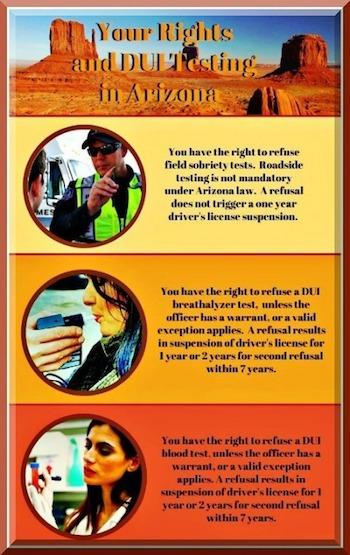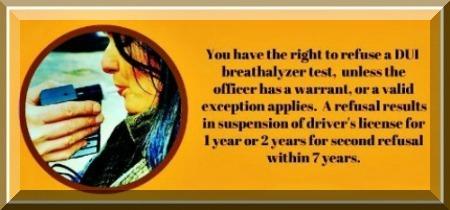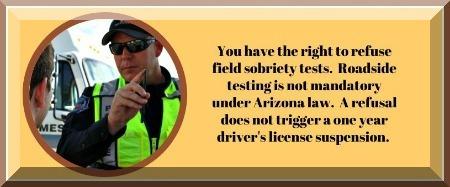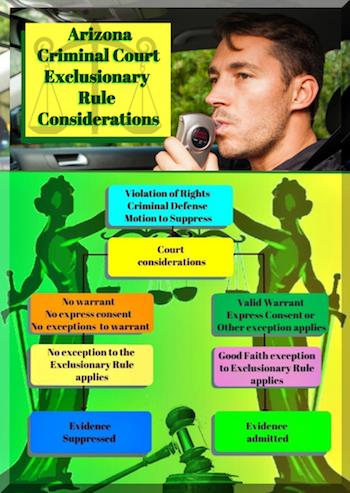DUI Breathalyzer, Blood, and Roadside Tests
DUI Breathalyzer, Blood, and Roadside Tests | Criminal Defense for DUI Test Evidence
DUI Defense Attorney Mesa AZ

Police in Arizona may ask drivers to take a DUI breath, blood, or urine test, if they are suspected of driving impaired due to alcohol or drugs.
Both Arizona and Federal Courts have long recognized that a person’s Constitutional rights must be considered in DUI testing.
The 4th Amendment of the U.S. Constitution and Arizona Constitution Article 2- Section 8 provides individuals with the right to privacy, and the right to be free from unlawful search and seizures. This includes DUI breath, blood, urine, and similar chemical testing, without a valid warrant.
The 5th Amendment of the U.S. Constitution, and Arizona Constitution Article 2- Section 10, affords individuals the right to be free from self-incrimination. Therefore, when a person refuses a warrantless DUI breath, blood, or urine test, they are implicating this right. Drivers in Arizona should be aware that a refusal will result in adverse consequences of driver’s license suspension, regardless of the fact that they are exercising this rights. This is because anyone driving in Arizona will be subject to Arizona’s Implied Consent law.
There are a number of impaired driving tests available for police to request. The type of test to be conducted will be determined by the police officer.
Not all impaired driving tests call for suspension of a person’s driver’s license for a refusal. The only tests which trigger automatic driver’s license suspension upon refusal, are those specified under Arizona’s Implied Consent law A.R.S. 28-1321 (A). Those DUI tests named under the statute include:
- DUI breath test;
- DUI blood test;
- DUI urine test; and
- Other DUI bodily substance tests.
The purpose of conducting these particular tests is to determine the blood alcohol or drug content in a person’s bodily system. Note that DUI field sobriety or roadside tests do not apply.
Below are answers to common questions about DUI testing, Arizona’s Implied Consent Law A.R.S. 28-1321, mandatory DUI testing, consequences of refusal, and criminal defenses related to DUI evidence and rights violations.
Are drivers required to take DUI breathalyzer test in Arizona?
A DUI breathalyzer test is considered a protected search under the 4th amendment of the U.S. Constitution.
A driver is not required to take a DUI breathalyzer test in Arizona, unless the law enforcement officer has a search warrant. Alternatively, if a person refuses the test, or the officer does not have a warrant, they may still conduct the test if they reasonably believe that a valid exception to the warrant applies to the circumstances.
Under Arizona’s Implied Consent law A.R.S. 28-1321, there are consequences for refusing the DUI breath test. Consequences include a one year suspension of driver’s license, or two year suspension of driver’s license for a second refusal within seven years.
Immediately following refusal of a DUI breathalyzer, driver will be required to surrender their driver’s license. In exchange for their driver’s license, the driver will receive a temporary driving permit.
The temporary permit expires 15 days after issuance. During those 15 days, the driver can request a hearing with the Arizona Motor Vehicle Department (MVD). If the driver does not request a hearing, the license will automatically be suspended.
There are exceptions to a search warrant requirement for police. One of the most common exceptions related to DUI breath testing is “express consent.” The Implied Consent Law driving suspension is intended to discourage drivers from refusing the DUI testing.

What are some defenses for DUI breathalyzer test results?
A number of defenses exist to challenge DUI breathalyzer tests in Arizona. The defenses that apply are based on the circumstances surrounding the police stop, DUI testing, and arrest. Below are 7 examples of defenses that could apply:
- DUI breath test was conducted in violation of your 4th amendment rights.
- Your blood alcohol content (BAC) and charges were based results taken from a portable breathalyzer test (PBT). PBTs are not properly subject to the same reliability, maintenance, and calibration standards as the official intoxilyzer machines used by police. Therefore, the results of the PBT are not admissible in court.
- Errors occurred, in the police instruction, or administration of the test.
- The breath tests were contaminated.
- The intoxilyzer machine was not working properly working, calibrated, or maintained.
- Only one test was administered, and two are requited for comparison.
- The duplicate test was too far out of range from the first test.
The most effective way to challenge DUI breath test is to retain an experienced and knowledgeable criminal defense attorney to represent you in your charges.
Are drivers required to take a DUI blood test in Arizona?
No, a driver is not required to take a DUI blood test, unless the officer has a lawful warrant, or another valid exception applies.
Under A.R.S. 28-1321, Arizona’s Implied Consent law, a refusal in and of itself, triggers motor vehicle department DUI driver’s license suspension for one year, or two years for a second refusal within 7 years.
The U.S. Supreme Court recently held that DUI blood tests are even more obtrusive to a person’s right to privacy than DUI breath tests, and therefore, a search warrant is still required for DUI blood tests administered incidental to arrest (Birchfield v. North Dakota 2016).
Among the lawful exceptions of the search warrant requirement, is a person’s express consent.
In order for a person’s consent to be valid, it must also be voluntary. If a challenge is raised by criminal defense as to the voluntariness of the person’s consent, the court will consider the totality of the circumstances to make its determination as to the voluntariness of the consent.
If the court agrees that the consent was coerced, or not otherwise given voluntarily, then the test was conducted in violation of the person’s rights.

What are some defenses for DUI blood test evidence?
Often when individuals have high or extremely high alcohol blood content (BAC) results, they feel it is of no use to try to defend their charges. But the fact is that blood test results are not always valid, or accurate. Below are 7 examples of defenses that can be used for DUI blood test evidence when they apply to the circumstances:
- Errors occurred in the DUI blood test sample in handling, labeling, transport, or analysis, or preservation.
- The hospital blood test was invalid. Hospitals are set up to provide testing and treatment for sick and injured patients, and not to collect or process criminal evidence. Their governing guidelines and protocol may not coincide with those of law enforcement agencies for purposes of prosecuting defendants.
- Errors occurred in the blood draw such as improper arm cleaning.
- A material discrepancy existed in the police blood test results, and the independent lab retest results processed at the request of your criminal defense attorney.
- The blood kit itself had not been properly inspected, exceeded the expiration date, was not properly sealed, or was not stored at the proper temperature.
- The blood was not drawn within 3 hours of the last alcohol consumption, causing the tests results to be invalid.
- The officer did not have a warrant, the individual did not consent to the blood test, and no other exceptions to the warrant applied.
For more defenses for DUI breath, blood, or urine tests, you can download our free resource book “101 DUI Defenses” written by James Novak of the Law Office of James Novak.
Are drivers required to submit to Field Sobriety Tests?
Drivers are not required to submit to Field Sobriety Testing (FST). These are also known as roadside tests, and are not named under Arizona’s Implied Consent law. Thus, the MVD driving suspension is not triggered by refusal of roadside testing.
Despite the fact that they are not required, a refusal may still have consequences that are not statutory. For example police may proceed with obtaining a warrant for other DUI testing, and making an arrest with probable without the roadside tests.
Roadside tests results are limited, unreliable, and often considered non-objective in nature. For these reasons they are often successfully challenged by criminal defense attorneys. FSTs are not, and cannot be admitted as evidence of a person’s blood alcohol content (BAC), and have been the subject of critical analysis in courts throughout the country (United States v. Horne, 2002).
The Standard Field Sobriety Tests are a battery of non-invasive roadside performance tests sponsored by the National Highway Traffic and Safety Administration (NHTSA). They include the following:
- The Walk and Turn;
- One- Leg-Stand; and
- Horizontal Gaze Nystagmus test
Some drivers choose to take the tests because they feel it will prove they are not driving impaired. However, it can have the opposite impact. Most criminal defense attorneys believe it is not a good idea to consent to them because of their high inaccuracy and low liability rates.
For these reasons it is recommended that you politely refuse to participate in roadside testing when requested by police.

What are some defenses for Field Sobriety Test Evidence?
Field Sobriety Tests (FSTs), also known as roadside tests, are likely the most challenged DUI tests for purposes of criminal defense. Below are 7 common defenses to FSTs:
- The FSTs were not administered in accordance with the National Highway Traffic and Safety Administration (NHTSA) guidelines which were adopted in Arizona.
- Due to stress, anxiety, fatigue, medical or other physical limitations unrelated to alcohol or drugs, the driver performed poorly on the tests.
- The time, location, landscape, or climate interfered with the individual’s ability to perform well on the tests.
- The FSTs given were not one of the three standardized FSTs sponsored by NHTSA.
- Due to the noise, traffic, or a language barrier, the individual was unable to hear or understand instructions from the police officer.
- The individual did well on the tests, but the police officer did not grade the person objectively or fairly.
- The individual was not a good candidate to participate in the tests based on NHTSA guidelines for body weight of 50 pounds or more above average for their height, or the person was 65 years of age or older.
If you were arrested for refusing to take the tests; failing the tests; or you were told that the roadside tests were required, it is important that you retain an experienced criminal defense to challenge the tests results, and protect your rights.
What happens if police violated my rights to obtain the DUI tests?

When police violate your constitutional rights in the process of collecting evidence, then the search and seizure is unlawful. The same is true when police obtain DUI breath, blood, or other chemical evidence unlawfully.
The remedy available by the court when a person’s rights were violated in the process of obtaining the evidence is to suppress it. This means that that the evidence gathered by the police unlawfully cannot be used against you by the prosecution.
The process of suppressing evidence begins with a defendant’s criminal defense attorney filing a motion to suppress for the court to consider. The judge will review the motion and make a determination based on the facts presented. The court will also consider if any exceptions to the warrant apply, or any exceptions to the exclusionary rule of evidence applies.
If the court agrees to suppress evidence obtained unlawfully, it usually leads to a dismissal or acquittal, because the prosecution cannot use the material evidence to prosecute the defendant.
What is the Exclusionary Rule?
The exclusionary rule is a legal remedy in which the court prohibits the prosecution from using evidence against a defendant that was obtained in violation of their rights.
The United States Supreme Court has recognized this legal doctrine for over a century. Courts throughout the U.S. and Arizona have applied the rule for nearly 60 years.
Under the exclusionary rule, the defense may file a motion to suppress evidence such as that obtained from unlawful search and seizures, unlawful questioning, or illegal interrogation.
The purpose of the exclusionary rule is to discourage police from intentionally infringing on a suspect’s constitutional rights. It also provides a remedy to defendants whose rights have been violated by police who have obtained evidence in violation of a person’s rights.
A few exceptions can apply to the exclusionary rule, that the court will consider. For example, if the officer acted reasonably, and in “good faith” according to precedent case law, the judge may deny the motion to suppress, and allow the evidence to be admitted. This is known what is known as an “exception to the exclusionary rule.”
Why do I need a criminal defenses attorney for my DUI charges?
You have a constitutional right to retain a criminal attorney to defend you in your charges. This is the case no matter how high the BAC, or serious the circumstances surrounding your DUI arrest. When you face impaired driving charges, your freedom and future are at stake due to the harsh penalties in Arizona.
A first-time, non-extreme DUI conviction calls for penalties that include serving 10 days in jail; fines of $750.00; administrative driver’s license suspension of 90 days; use of ignition interlock device (IID) after the suspension has expired; drug or alcohol education and screening; and courts costs. The higher the BAC conviction, the higher the penalties. Repeat offenses also elevate the charges and penalties.
Aggravated DUI is a felony in Arizona. A felony DUI can be classified as a class 4 or class 6 depending on the factors that raised it to a felony. All felonies expose a person to prison terms of 10 days to 30 days for a class 6; and 4 months to 8 months in prison for class 4 felonies; fines of $4,000.00; driver’s license revocation for one year; IID for two years; and alcohol or drug education and screening.
The job of the prosecutor is to convict you. Neither the judge nor prosecution has the obligation of defending you, or making the process any easier for you. The prosecution and state are also under no obligation to try to find weaknesses in the evidence, a way to lower your penalties, or dismiss your charges.
For these reasons it is critical that you retain your own legal advocate, and make sure your rights are protected throughout the criminal process. You will need an effective criminal defense attorney who has the knowledge, skills, and experience in defending DUI charges in Arizona.
James Novak, of the Law Office of James Novak is a former Maricopa County Prosecutor and experienced criminal defense attorney. If retained James Novak will conduct his own investigation to determine if your rights were violated, examine the evidence that the prosecution plans to use against you, gather any favorable evidence, and point out weaknesses in the prosecution’s case. He will be your voice in the criminal justice system, and fight to get the best possible outcome so that you can put the charges behind you.

James Novak has extensive knowledge, skills, and experience in handling all types of Arizona DUI cases, including those involving challenges the of results of DUI breathalyzer tests, blood tests, and field sobriety test evidence.
If you have been arrested and charged with a DUI in Chandler, Phoenix, Mesa, Tempe, Gilbert, and Scottsdale in Maricopa County, contact dedicated Arizona DUI defense attorney James E. Novak today at (480) 413-1499.
James Novak, of The Law Office of James Novak has over 20 years of experience and provides exclusive criminal defense for those charged with impaired driving, and other crime, in his service area. To learn more, and to schedule your free consultation today, contact James Novak through our on-line form, or call 480-413-1499.
Additional Resources:
- Arizona Department of Transportation – Request a DUI suspension hearing
- Arizona Department of Transportation – Executive Hearings FAQ
- Arizona Department of Transportation – Request to reinstate driver’s license
- A.R.S. 28-3317 – Appeal of MVD decision
- A.R.S. 28-1321 Arizona Implied Consent – DUI test refusal, hearing, permit
- A.R.S. 28-1381 DUI laws
- A.R.S. 28-1388 Admissibility of DUI breath and blood test evidence
- Arizona State Constitution Article 2, Section 10 – Protection from self-incrimination
- Arizona State Constitution Article 2. Section 8 – Right to privacy
- Chandler Police Department DUI Enforcement Unit
- Chandler Municipal Court – Criminal Proceedings
- Maricopa County Superior Court – Resources












